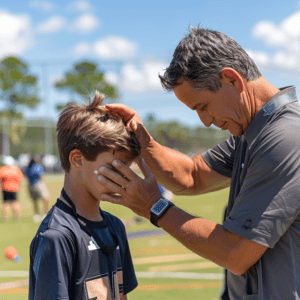Understanding Brain Injuries and Prevention
It’s Brain Injury Awareness Month! You probably know it’s important to safeguard against injury but how? And what happens if you or a loved one does get injured? Read on to learn how to prevent brain injuries, how to manage symptoms, and the role chiropractors can play in supporting those who have sustained an injury.
How Common are Brain Injuries?
Brain injuries can occur from sports, falls, and motor vehicle collisions – general day to day living or activities that most of us engage in. While data exists, brain injury statistics are challenging because they are based on hospital and doctor reporting. Often brain injuries are not reported at the time they occur, or patients do not report them at all
Why Early Detection Matters
Early detection of concussions is crucial in minimizing the duration and severity of post-concussion symptoms. Research indicates that prompt diagnosis and management can significantly improve recovery outcomes (Source: Canadian Guideline on Concussion in Sport). At Alliance Chiropractic, our chiropractors are equipped to assess and diagnose concussions, tailoring individualized treatment plans for each patient. This approach ensures that those who have sustained concussions receive timely and effective care, helping to mitigate long-term impacts and promote a faster return to normal activities.
On-Field Assessment and Referral
During sports events, chiropractors can provide immediate field-side assessments. If an athlete is suspected of having a concussion, a chiropractor can determine whether urgent medical attention is needed or if the athlete should see their medical doctor or nurse practitioner. This prompt response is crucial in preventing long-term neurological issues.
The Importance of Rowan's Law
Rowan’s Law (Concussion Safety) mandates specific protocols for preventing and managing concussions in youth sports. Chiropractors play a vital role within this framework by offering their expertise in diagnosing and managing sports-related concussions.
Practical Tips for Preventing Brain Injuries
Sports Safety
- Wear Protective Gear: Always wear helmets and other safety equipment when engaging in contact sports, biking, or other activities where head injuries are possible.
- Avoid Reckless Play: Encourage safe play and avoid actions that could lead to injuries.
- Get Symptoms Checked: Do not ignore concussion symptoms. Seek medical attention immediately.
Fall Prevention
- Improve Home Safety: Ensure your home is well lit and free of obstacles to reduce the risk of falls.
- Regular Checkups: Schedule regular eye and balance checkups.
- Use Safety Devices: Install guardrails and other safety devices at home.
Vehicle Safety
- Wear Seatbelts: Always wear a seatbelt in any moving vehicle.
- Drive Safely: Follow traffic rules and avoid driving under the influence of alcohol or drugs.
- Use Helmets: Wear helmets when riding bikes, ATVs, or snowmobiles.
The Role of Chiropractors in Concussion Care
Chiropractors are highly trained healthcare professionals equipped to handle various health conditions, including concussions. At Alliance Chiropractor, Dr. Morphet can:
- Assess and diagnose concussions
- Provide informed referrals for further medical evaluation.
- Collaborate with interprofessional care teams to manage and treat concussions.
Chiropractors have extensive training in clinical practice, neurological assessment, and emergency care. This expertise allows them to diagnose mild traumatic brain injuries (mTBI) and concussions effectively.
Conclusion
Preventing brain injuries and minimizing post-concussion symptoms requires awareness, taking precautions, and timely medical intervention. With over 25 years of experience and expertise, we have helped hundreds of patients. We can provide tips for injury prevention, assess and diagnose concussions or other conditions, manage symptoms post-injury, or all of the above.
Serving families from Ancaster and the Greater Hamilton Area, contact us if you have any questions regarding this blog or any other health or wellness concern.
The source of the information can be found here: Government of Canada, Brain Injury Canada, and Ontario Chiropractic Association.

